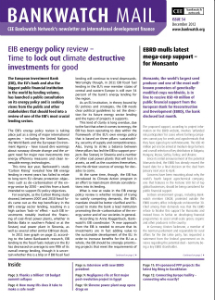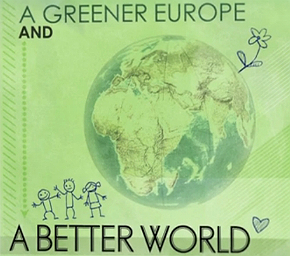Thanks a trillion! EU budget summit fails – but green spending hopes still alive

Bankwatch Mail | 14 December 2012
It was no surprise when the European Council summit meeting dedicated to deciding the EU’s budget for 2014-2020 broke down in Brussels on the afternoon of November 23 with no deal having been reached. The main surprises were how early on the Friday afternoon the EU’s 27 member states decided enough was enough, as well as the relative lack of rancour on display.

This article is from Issue 54 of our quarterly newsletter Bankwatch Mail
Browse all articles on the right
The general spin line was provided by European Council president Herman van Rompuy, whose Herculean mission had been to secure a deal, with pre-summit suggestions that he would keep Europe’s leaders locked up until the Sunday in an effort to bridge some firmly entrenched differences of opinion mostly centred on the size of the 2014-2020 budget pot. Van Rompuy’s post-summit statement tried to put the emphasis on the positives: “The bilateral talks yesterday and the constructive discussion within the European Council show a sufficient degree of potential convergence to make an agreement possible in the beginning of next year.”
And so it is widely expected that the EU budget wagons will be drawn up for more negotiations at another EU summit either in January next year or, more likely, February. What does seem to have been achieved is broad acceptance that the European Commission’s approximately EUR one trillion proposal figure will have to be cut, with van Rompuy again pointing out that the proposal he tabled during the summit is: “80 billion euro below the Commission proposal and a real cut compared to the 2007-2013 period. This is a first in EU budget talks.”
Keep up to date with the EU budget negotiations on Twitter
Commission president José Manuel Barroso also appears to have fallen into line with this view, though the European parliament – for the first time having veto power over the seven year bloc spending – may still be shaping for a fight in the new year.
Bankwatch and other environment groups, that had been surveying the pre-summit budget battleground with a fair degree of incomprehension and frustration, are now stepping up their calls for the future negotiations to have quality EU spending squarely at the top of the agenda. The collapsed talks may have been yet one more example of Europe’s leaders letting down the continent, but if there is one vital lesson to be learned it is that squabbling over gross sums of money can now be overcome by a focusing instead on the huge potential of the budget to improving quality of life in Europe, our shared environment and our economic prospects.
Going into the new year, we will be stepping up our call for 25 percent of the EU budget for 2014-2020 to go to green spending (the Commission’s 20 percent ‘climate mainstreaming’ proposal remains intact within Herman van Rompuy’s latest proposal document). Such a figure would unlock substantial investment money for projects like energy savings and renewables that can cut Europe’s greenhouse gas emissions, create millions of new green jobs and reduce fuel poverty.
A greener EU budget to exit the crisis
The justification for going beyond 20 percent? Well, the string of new reports from such organisations as the United Nations, the International Energy Agency and the European Environment Agency on the eve of the failed summit, all painting an emphatically worsening climate change picture, are important indicators of the scale of the challenge now facing Europe and the wider world.
Now is not the time for half measures. A deal on the future EU budget must now be realised at the earliest opportunity, and that message appears to be sinking in around Europe’s capitals. Whether Europe’s leaders recognise that they cannot afford to let a positive, quality-driven, green deal go begging again does remain, scandalously, open to some doubt.
Theme: Energy & climate | Transport | Resource efficiency
Tags: BW Mail 54 | EU budget | MFF
Never miss an update
We expose the risks of international public finance and bring critical updates from the ground. We believe that the billions of public money should work for people and the environment.
STAY INFORMED

